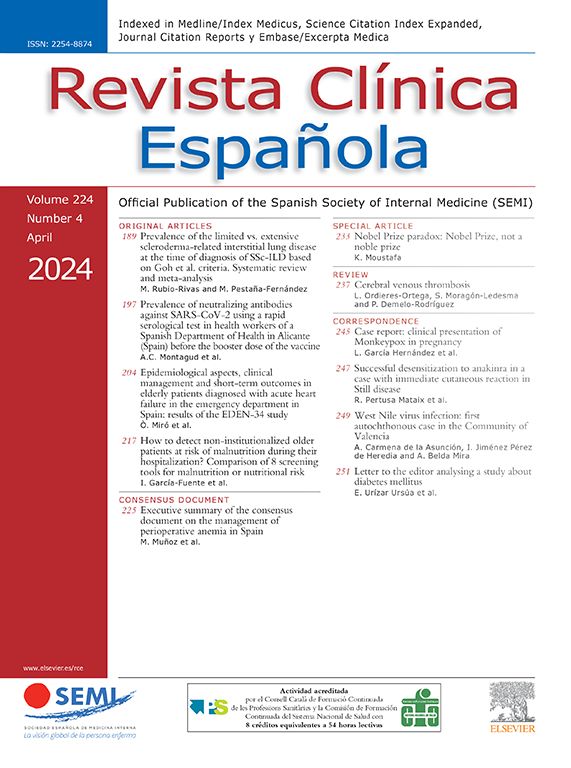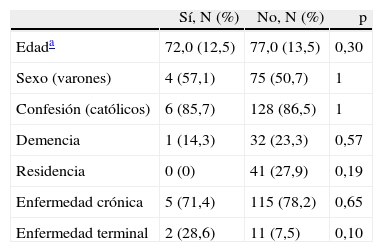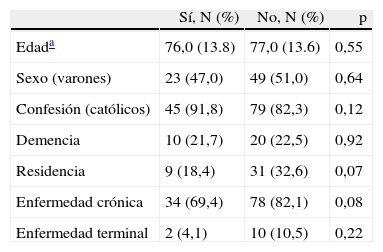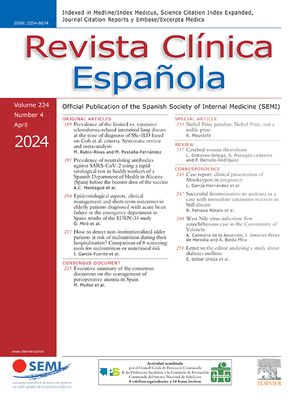El nivel de conocimiento y las actitudes de los pacientes ante las instrucciones previas (IP) es un tema poco conocido, dado que su implantación en la Comunidad de Madrid es reciente.
ObjetivosValorar el nivel de conocimiento y de implantación de las IP en los pacientes ingresados en el Servicio de Medicina Interna de un hospital público de la Comunidad de Madrid, las actitudes de los pacientes ante estos documentos y su correlación con variables sociodemográficas.
Pacientes y métodosEstudio transversal mediante encuesta de opinión estructurada, cerrada y voluntaria realizada a todos los pacientes ingresados en el Servicio de Medicina Interna del Hospital Universitario Fundación Alcorcón en las fechas 20 de mayo y 3 de junio de 2008.
ResultadosSe incluyeron 155 pacientes. En el 57% de los casos contestaron los mismos pacientes y en el 42% contestaron familiares directos. La edad media de los pacientes fue de 77 años, el 50,9% fueron varones y el 86,45% eran católicos. Solo 7 (4,5%) pacientes sabían lo que eran las IP y únicamente un paciente las tenía realizadas. Tras conocer su existencia, a 49 pacientes (31,6%) les gustaría realizar las IP. El 80,6% de los encuestados estaban a favor de que el documento de IP constase en la historia clínica y el 72,9% no creen que tenerlas realizadas modifique la actitud del médico.
ConclusionesA pesar de que la regulación sobre las IP en la Comunidad de Madrid tiene ya 5 años, son documentos poco conocidos y están aún en período de difusión.
The level of knowledge and attitudes of patients towards the previous instructions is a little known subject given that their introduction in the Community of Madrid (CM) is recent.
AimsTo assess the level of knowledge and implementation of advance directives in patients admitted to an Internal Medicine Service of a public hospital in the CM, the attitudes of patients regarding these documents and their correlation with demographic variables.
Patients and methodsA cross-sectional study through structured survey of opinion, closed and voluntarily given to all patients admitted in the Internal Medicine Unit of the University Hospital Alcorcon Foundation on the dates May 20 and June 3, 2008 was carried out.
ResultsA total of 155 patients were included, the questions being answered by the patients per se by 57% and by members of theirs families in 42%. Mean age of the patients was 77 years, 50.9% were male and 86.45% were Catholic. Only 7 patients (4.5%) knew what the advance directives were and only one patient had done them. On learning of their existence, 49 patients (31.6%) would like to do the advance instructions. Of the respondents, 80.6% were in favor of having the advance directives document in their medical history and 72.9% do not believe that having these advance directives would change the attitude of their doctor.
ConclusionsAlthough the regulation of advance directives in the Community of Madrid has already been in force for 5 years, little is known about these documents and they are still in a period of diffusion.
Article
Diríjase desde aquí a la web de la >>>FESEMI<<< e inicie sesión mediante el formulario que se encuentra en la barra superior, pulsando sobre el candado.

Una vez autentificado, en la misma web de FESEMI, en el menú superior, elija la opción deseada.

>>>FESEMI<<<







